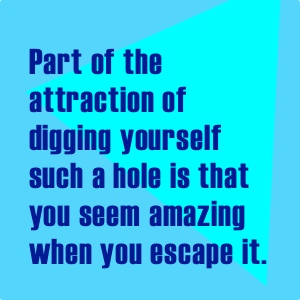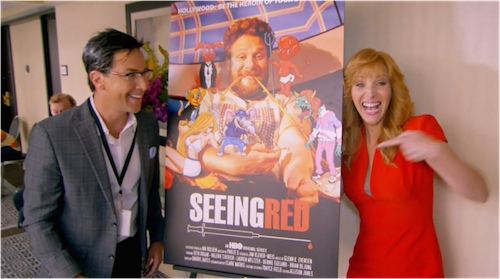I just got done watching the new season of The Comeback – a mock reality show about a pathetic aging sitcom star, Valerie Cherish (played by Lisa Kudrow). I consider myself a comedy connoisseur, and this show to be top notch. So if you haven’t seen it, check it out on HBO – I give it 5 stars.
Anyhow, this season of The Comeback sees Valerie involved in a new autobiographical show about Pauly G, a writer who is a “recovering heroin addict”, and all the trouble his addiction got him into. Checkout the silly poster for the show within the show within the show below:
There was one joke that I particularly loved (it was probably my favorite tv moment of the year). At one point, Valerie is speaking with big shot TV producer who praises her work on the show, but then continues disdainfully about the show in general:
Producer: I could’ve done with like 10,000 less needle close-ups.
Valerie: Well, he was a junkie, you know.
Producer: I got that right away.
It’s understated, but it’s clearly a dig at addiction memoirs in general – at how vapid, predictable, and dime-a-dozen they tend to be. The authors of these memoirs love the shock value, they think they’re so badass because they’ve gone to such extremes, and that their struggle is so monumental. The “10,000 needle close-ups” is really the perfect concretization of all of this. In reality, it’s just boring. We’ve all seen it a million little times.
 I understand the pull toward romanticizing the “struggle” though. I felt like I had done something monumental when I stopped living that “addict” life. But in retrospect, I just made the choice to ditch a path that sucked, and to try to build a better life for myself. In the early days, my heroin “addiction” and “triumph” over it was all that made me special. In retrospect, there’s nothing special about it.
I understand the pull toward romanticizing the “struggle” though. I felt like I had done something monumental when I stopped living that “addict” life. But in retrospect, I just made the choice to ditch a path that sucked, and to try to build a better life for myself. In the early days, my heroin “addiction” and “triumph” over it was all that made me special. In retrospect, there’s nothing special about it.
I see heavy substance as a fully free choice – no matter how extreme the usage and drama that comes with it is. So, I also think that so-called addicts and alcoholics dig their own holes. Some of us even enjoy getting into that pit – we find it thrilling – we’re attracted to it. Part of the attraction of digging yourself such a hole is that you seem amazing when you escape it. It’s like some stunt by Houdini on a bigger scale, presented with far more drama, because we spend years in that hole, and the world generally thinks we didn’t dig that hole ourselves but were instead thrown into it by our disease – that we were oppressed victims overcoming something massive.
A few years after I stopped problematically using substances, I started writing a self help book about addiction. I had recently moved to New York City, I was open about my background. I was 29 years old, going back to school and restarting my life, finally chasing some dreams and trying to make something of myself – because I had been a fuck-up right up until a few weeks before my 26th birthday. I told my addiction stories liberally because people were fascinated by them, it was all I had known for many years, and it was all that made me interesting at that point.
People would tell me all the time “you should write a book!” To which I’d respond “I am writing a book, it’s a self-help manual on how to get over your addiction!”, to which they’d respond, “no, I mean you should write a memoir.”
Ugh. I didn’t want to write a memoir because they weren’t helpful in my opinion. They were self indulgent, self-congratulatory romps. Now trust me, I like to be self-congratulatory and toot my own horn. I’m not afraid of being publicly proud, but the idea of a pure memoir just didn’t seem to have any redeeming value to me. I hadn’t really read them, but I’d read enough excerpts, sat through enough meetings, and watched enough addiction movies, to know that they’re the same basic storyline again and again.
However, here I was getting social mileage off my history and even using it to get ahead in the theater world, where I was trying to make a go of it as an actor. A new friend and bigwig at the theater where I was training asked me to tell one of my stories in a prestigious comedic storytelling show at the UCB Theatre (Nights of Our Lives).
I told the tale of my last night living in a crackhouse, and it killed. People engaged me in conversations over that story for years, I was recognized on the street for having told it, and I got several invitations to tell similar stories elsewhere, and many encouraged me to put together a one man show of such stories. I mostly refused these suggestions though because it felt self-indulgent. If I told these stories, they had to be helpful, and I just felt like they were not helpful – I felt like they glamorized “addiction.”
Now getting back to digging a hole…
I saw The Gambler last week. I chose to see it because the screenwriter said that he doesn’t believe in addiction and thus didn’t write the movie as if the main character was addicted. He just wrote about a guy who loved the kind of gambling he was doing. I was intrigued.
IMO, the movie delivered big time. Maybe that’s because I knew the writer didn’t believe in addiction, and maybe it’s because of my own beliefs, but I think I really saw what the writer was going through, and it was different. It was new. It was interesting. And, it ties many things together for me.
The main character played by Mark Wahlberg comes from a wealthy family, has a fancy car, a stylish home, and has a cushy job as a college professor making 6 figures a year, with no family to care for. He is a published mediocre novelist. He prattles on about existential issues to his students, pushing his view that greatness/genius is an accidental deterministic thing – that it doesn’t really matter how much you try. To me, this is clearly a way to deal with his own failure at greatness. He had/has every advantage, and hasn’t made any achievements he considers meaningful, nor does he feel he is capable of doing so. Life, to him, feels meaningless, and he feels like a meaningless nothing who can stay afloat doing what he’s doing, grow old and die, and not be remembered by anyone, never having left a mark on the world.

He likes gambling though. And even more so than liking gambling, he seems to like digging himself into a giant hole by gambling. He goes into debt for hundreds of thousands of dollars with several gangsters. He has multiple opportunities to pay off his debts throughout the movie, and yet chooses not to, and seemingly chooses to make insane bets guaranteed to lose the money yet again. He digs a hole so deep that there’s no way out.
Again, he seems to like digging this hole, and spoiler alert: he gets out of it triumphantly at the end. Nothing seems to change in his life to make him want to finally get out of this mess – so one can only assume that he wanted to dig a hole that would be sufficiently exciting enough to get out of. There was no obligatory epilogue wherein Wahlberg tells his war story in a Gamblers Anonymous Meeting, nor does one get the sense that this character would ever do such a thing. He just liked digging the hole and getting out of it.
That, I am afraid, is what fuels addiction for some people – or at least it’s one part of what fuels it for many people. But the obligatory epilogue may also be what fuels “recovery” for many people – that war story telling, identification as a dangerous badass, and little pond to settle into. I’m afraid that “addiction & recovery” is becoming the American rite of passage for lack of a better one. It’s a guaranteed way to have a dramatic, interesting life. You get your struggle, and you overcome it – you get in the hole, and you get out. And then you get to be humble and happy with a boring humdrum life, because you’re delicate, dark, and complicated, and you have enough on your plate just worrying about staying in recovery and dealing with your “demons.” It’s an easy accomplishment, as opposed to real accomplishment – a way to say that you conquered something and to justify your chosen path of mediocrity.
Trust me, I see the pull to do that. I was there, and I decided to reach higher – I decided I would accomplish more than recovery, or at least I would try. As it turns out after exploring many possibilities, I decided to gravitate toward making my mark on the world of addiction. I hope I’ll be spectacular at it. I don’t want to be mediocre. I want to generate work that genuinely helps people. I don’t see this as living in the past though. I’ve tried to make my work about principles that can be learned through research, observation, and experience, rather than about “do what I did to get what I got.” I don’t do this work to “stay sober” because I think I totally dealt with that problem, and it’s over with.
I don’t think I’m alone in this, so please don’t take it that way. Many people reach for much more than recovery. Many people enjoy staying “in recovery” (as in working every day to keep the boogeyman of addiction away) for the rest of their life, and if that’s what truly floats their bot, I’m not against it. However, I don’t want to be part of glamorizing the familiar path of crashing and burning at a young age, getting “into recovery”, and then living a small life with no progress afterwards, being satisfied with your extremely local underground fame as a recovering addict badass.
Addiction is always just a freely chosen pattern of behavior based on preferences developed by freely made choices, and changeable by choices – it’s often a trap that people sort of get themselves into, and can’t figure out how to get out of. However, sometimes it is clearly a bunch of stupid nihilistic choices, in which the hole is dug as much for the pleasure of the high as for the excitement of getting into the hole. It’s not cool. There are so many cooler, productive triumphs to be had than digging yourself into a hole and then climbing out.


Great blog post, thank you. Reading this is a continuing antidote to the false meme that addiction is a disease that grows (dramatically) stronger, and is a condition that only a Higher Power will cure.
For me, dramatization of addiction started with the late 1970’s made-for-TV drama “Sarah T, Portrait of an Alcoholic.” Yet despite that this, and other media devices propagate the disease myth, and the overly heroic efforts (allegedly and dramatically) needed to overcome it, about 75% of people with substance abuse disorder “recover on their own,” which is to say that they find a balance to where their habit is conducted in moderation, or relegated to complete abstinence. Yet there is a rock star status given to the 1%, if you will, of those who have the same problem, and reflect 12-step testimonial in their brand of recovery.
Great post. I too am of the opinion that it is free choice, whether if feels like it or not.
You might get something out of this review:
http://www.naturalism.org/Heyman.htm
This post is great, and hit especially close to home for me. I tried to get people interested in my story of failure in the entertainment industry, but people weren’t particularly impressed by it, nor did they buy my ending of “…and that’s why I live a stable normal life now.” They just thought I was boring.
Also, I really enjoy how you dismantled the meme of “self-sabotage.” I can say from experience that I didn’t self-sabotage as much as I allowed challenges to accumulate, because I thought I’d look good for overcoming them.